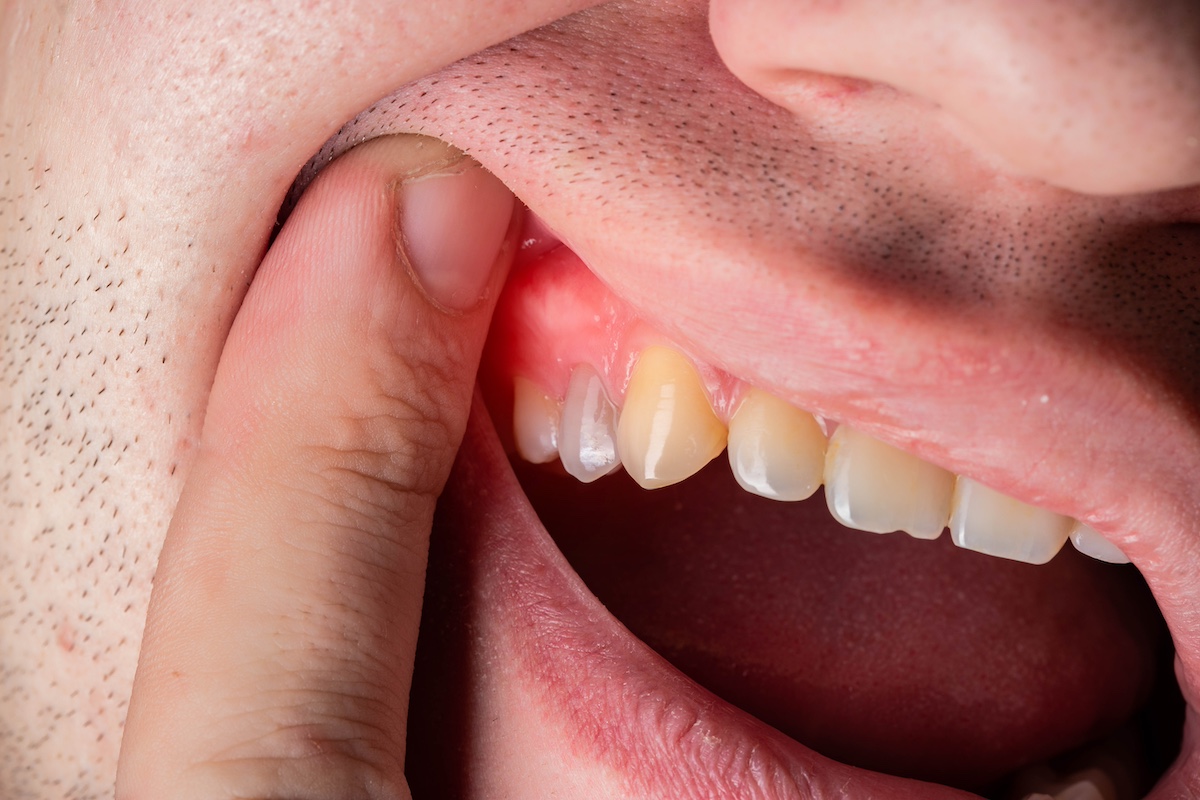While often overlooked, gum health is a crucial aspect of overall oral well-being, and any changes in their condition can be perplexing. One of the more puzzling occurrences is when the gums swell without pain. We see this issue frequently, and as dentists, we’re here to help you understand what could be causing it. Let’s explore the complex world of gum health, the potential causes behind painless gum swelling, and the essential steps to address, manage, and prevent this common problem.
Gum Anatomy
To determine the cause of painless gum swelling, it’s essential to understand their structure. Gums, or gingiva, are composed of multiple layers, each serving a distinct purpose. These layers include a dense network of blood vessels and nerve endings, making them highly sensitive to changes and potential irritation.
The Role of Gums in Oral Health
Gums, often considered little more than the pink borders surrounding your teeth, play a pivotal role in maintaining oral health. They shield the underlying dental structures from the onslaught of harmful bacteria and irritants. Beyond this protective role, gums have a crucial anchoring function, ensuring that your teeth remain secure in your jawbone.
Common Causes of Swollen Gums
Gingivitis
Gingivitis is one of the most common culprits of painless gum swelling. This mild form of gum disease silently penetrates the gingival tissues and often leads to more severe problems. Remarkably, gingivitis can progress without causing pain, making it a stealthy cause of swollen gums that often goes unnoticed.
Medication Side Effects
Certain medications can cause gum swelling as a potential side effect. Known as drug-induced gingival enlargement, this problem is associated with specific drug categories. The result can be painless yet concerning gum swelling.
Medications that can cause swollen, painless gums include:
- Antiseizure drugs
- Calcium channel blockers
- Immunosuppressants
Hormonal Changes
Hormonal changes, especially in women, can contribute to gum swelling. A well-known example is pregnancy-related gingival swelling, where shifts in hormone levels heighten blood flow to the gums and modify the body’s reaction to irritants.
Allergic Reactions
In some cases, gum swelling may be attributed to an allergic reaction. Toothpaste, mouthwash, or certain foods trigger this response in some people. Identifying the allergen responsible for the response is crucial in managing and resolving this type of gum swelling.
Medical Conditions and Swollen Gums
Periodontal Disease
Periodontal disease, which includes the more severe form known as periodontitis, can silently progress within the gums. This inflammatory condition affects the superficial gum tissues but goes much deeper, impacting your teeth’s support structures. While it sounds quite painful, many patients experience painless swelling in the initial stages of periodontal disease.
Systemic Illnesses
Systemic conditions like diabetes can significantly impact gum health. It can weaken the body’s ability to combat infection, potentially leading to gum problems that may not initially hurt.
The Link Between Hygiene and Gum Health

Establishing and maintaining an appropriate oral hygiene routine is vital to prevent and manage painless gum swelling. The primary culprit behind gum swelling is often an accumulation of plaque on teeth. Fortunately, taking good care of your teeth can prevent plaque from building up.
Gum-Friendly Oral Care Tips
Maintaining healthy gums starts with selecting the right tools and techniques for oral care. Opt for a soft-bristle toothbrush and use gentle, circular motions while brushing to clean effectively without irritating the gums. Flossing is equally crucial, as it removes plaque and debris from between teeth and along the gumline.
Routine dental check-ups are essential for gum health. They help identify and address potential issues early while keeping you updated on the best practices for maintaining or enhancing your oral hygiene.
When to Seek Professional Help
If you have swollen, pain-free gums, keep an eye on them. Regular monitoring provides valuable insights into the progression and nature of the swelling.
Red Flags for a Dental Visit
Certain signs and symptoms should immediately prompt you to seek professional dental care. These include persistent and unrelenting swelling, bleeding, pus discharge, or noticeable changes in the color of your gums. These symptoms may signify underlying dental issues that require prompt professional attention.
Diagnosis and Treatment
When you consult a dentist about painless gum swelling, you can expect a comprehensive evaluation. This typically includes a visual assessment of your gums, checking for periodontal pockets, and using X-rays or other diagnostic tools to understand the nature and extent of the condition.
Treatment Options
Treatment varies depending on the underlying cause of gum swelling. Addressing the root cause of the swelling is the only way to truly eliminate it. Treating the underlying problem may involve improving oral hygiene, discontinuing medication, or managing systemic illnesses. Your dentist might recommend medications or dental procedures as part of your treatment plan.
Preventing Swollen Gums
Preventing gum swelling, whether accompanied by pain or not, begins with proactive gum health measures. One of the most important steps in avoiding swelling is establishing a daily oral care routine that encompasses brushing, flossing, and using an antiseptic mouthwash. A balanced diet, rich in essential vitamins and minerals, also contributes to gum health.
Lifestyle Adjustments
Certain lifestyle adjustments can go a long way in promoting gum health and preventing painless gum swelling. If you are a smoker, dropping the habit can significantly reduce the risk of gum problems. Stress management and regular exercise can also be beneficial, as they contribute to reduced inflammation and improved immune responses in the body.
Conclusion

Painless gum swelling can be puzzling, but staying informed and proactive is your best defense in managing and addressing it. Identifying possible causes and taking timely action are crucial steps to overcoming or preventing this common issue.
Keep in mind that the absence of pain doesn’t mean there’s no cause for concern. Prioritize your oral health by caring for your teeth and gums and seeking professional advice when needed. By doing so, you can effectively manage painless gum swelling and maintain the health and comfort of your smile. If you have any concerns about your oral health, don’t hesitate to contact us today.
.

